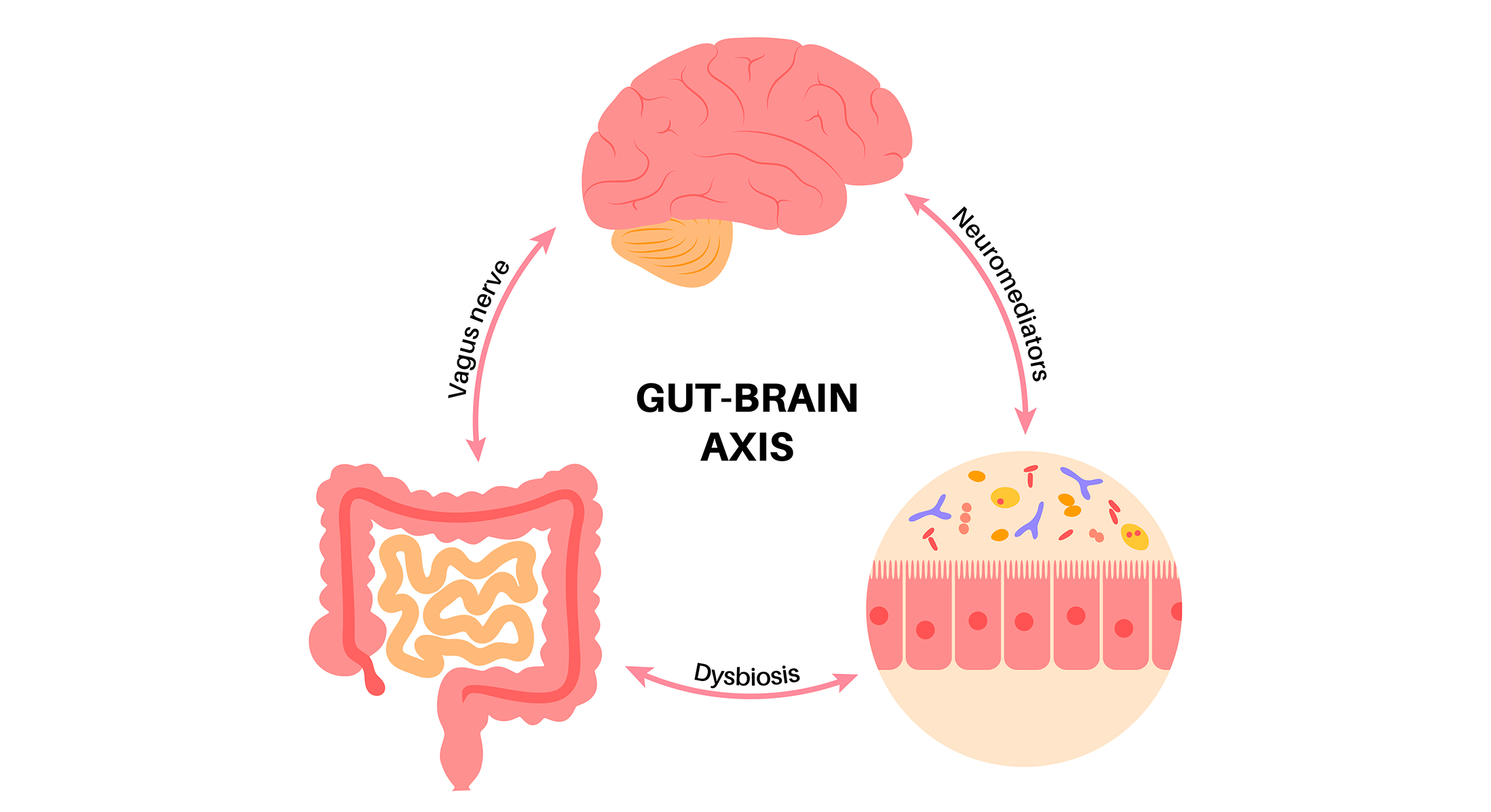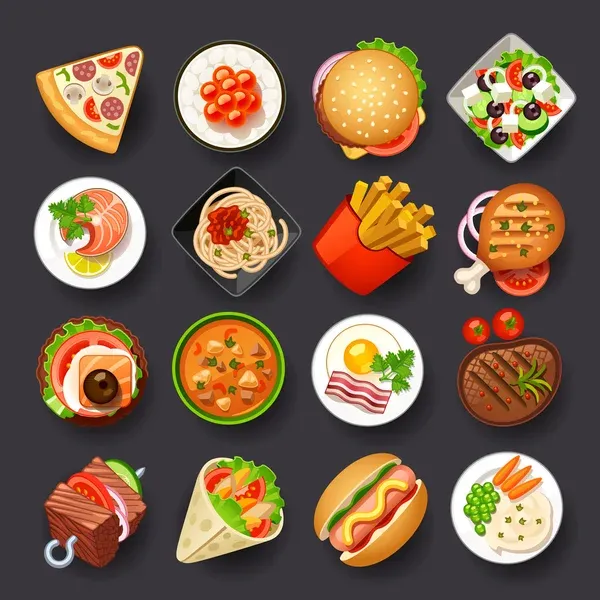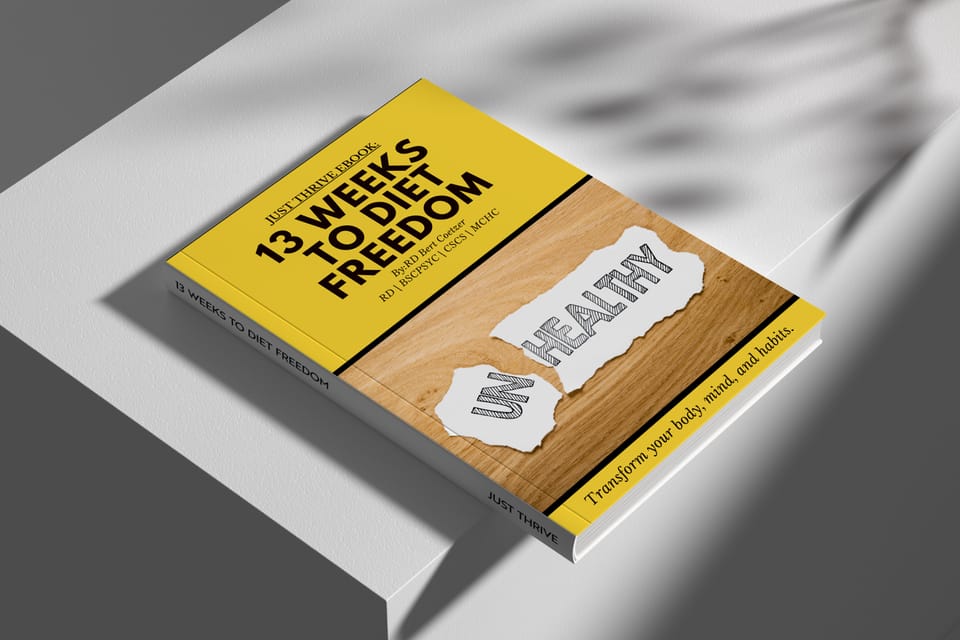Food + Mood... What’s the Connection?

It’s Friday evening, and you’ve just finished a long, exhausting week.
You collapse onto the couch and instinctively grab a bag of chips.
Each crunch feels comforting, and for a moment, the stress of your week seems to fade. But then, an hour later, you feel sluggish.
Your mood dips even lower than before.
You start wondering why this happens every time—how does what we eat affect how we feel?
This might sound familiar.
We’ve all had those moments when we’ve turned to food for comfort, only to feel worse afterward.
It’s easy to dismiss as just a “food hangover,” but there’s something deeper going on—a conversation between your gut and your brain that can shape your mood and mental health.
Today, we’re diving into this gut-brain connection to understand the biology, psychology, and strategies to feel better by nurturing this relationship.
The Biology: How Your Gut Talks to Your Brain
Your gut isn’t just for digesting food. It’s packed with trillions of microorganisms known as the microbiome, a vast community of bacteria that live in your digestive system.
These bacteria play a critical role in how your body processes food, but they also have a direct line of communication with your brain through something called the gut-brain axis.

The gut and brain communicate via nerves, like the vagus nerve, and through chemicals called neurotransmitters. What’s fascinating is that many of the neurotransmitters involved in mood regulation, like serotonin (the "feel-good" chemical), are actually produced in the gut.
In fact, about 90% of serotonin is made in your digestive system, not your brain.
When your gut microbiome is balanced, it supports the production of these neurotransmitters, which in turn help regulate your mood, anxiety, and overall mental health.
However, an unhealthy gut can throw off this balance, leading to inflammation, mood swings, and even more serious mental health conditions like depression.
A disrupted gut can result from poor food choices, chronic stress, or even illness. When the wrong kinds of bacteria start to dominate (often from processed foods, sugars, and unhealthy fats), this can cause your body to produce more stress hormones like cortisol, which makes it even harder to feel calm and balanced.
Why We Crave Comfort Foods
Why is it that when we’re stressed, we often crave things like pizza, ice cream, or fries? This isn't just about willpower—it’s deeply psychological and rooted in biology.

When you eat high-fat, high-sugar foods, your brain releases dopamine, the reward chemical. It’s the same chemical released when you experience pleasure, making these foods feel comforting in the short term. But like a bad relationship, the comfort doesn’t last.
Processed foods, while initially comforting, can cause your blood sugar to spike and then crash, leaving you feeling even more tired, irritable, or sad.
This rollercoaster effect creates a cycle where your brain starts to associate these foods with relief from stress, so you crave them more when life gets tough.
It’s also important to understand that stress eating is a coping mechanism.
Our brains are wired to seek out quick fixes when we’re overwhelmed, and food often feels like an easy escape.
But when we rely on this too often, it can lead to a negative loop of eating to feel better but ultimately feeling worse.
How to Support a Happy Gut (And a Happy You)
So how can we break this cycle and improve both our gut health and our mood?
The good news is that it’s not about depriving yourself of comfort—it's about finding balance and fueling your body in ways that support both your mental and physical well-being.
Here are some practical steps to get started:
1. Eat More Fermented Foods
Fermented foods like yogurt, kefir, sauerkraut, and kimchi are rich in probiotics, which can help balance the good bacteria in your gut. Studies have shown that people who consume more fermented foods tend to have lower rates of anxiety and depression.
2. Incorporate Prebiotics
Prebiotics are fibers that feed your healthy gut bacteria. You can find them in foods like garlic, onions, bananas, and oats. These fibers help your microbiome flourish, improving both digestion and mood regulation.
3. Limit Processed Foods and Sugar
While it’s tempting to reach for junk food when stressed, these foods can wreak havoc on your gut and mood in the long term. Focus on whole, unprocessed foods that provide sustained energy without causing blood sugar crashes.
4. Get Plenty of Omega-3s
Foods rich in omega-3 fatty acids, like fatty fish (salmon, mackerel), flaxseeds, and walnuts, have been shown to reduce inflammation in the body and support brain health, helping to stabilize mood and reduce symptoms of depression.
5. Practice Mindful Eating
Mindful eating isn’t about being perfect—it’s about tuning in to how food makes you feel. Start noticing how different foods affect your energy, mood, and mental clarity. Do you feel sluggish after certain meals? Do others make you feel calm or focused? These insights can help guide your choices.
Introspection: How Does Food Make You Feel?
As you head into the week, I encourage you to reflect on your relationship with food and mood. Try this exercise:
- What foods make you feel good emotionally and physically? Pay attention to how your body feels after eating certain meals. Do you feel energized or weighed down?
- When do you turn to food for comfort, and how does it affect your mood afterward? Is there a pattern you notice when you’re stressed or anxious?
- What small changes can you make? Whether it’s adding more fermented foods, cutting back on sugar, or simply becoming more mindful of how you eat, start with one small shift. Over time, these changes can add up to big improvements in both your gut health and mood.
Taking care of your gut isn’t just about digestion—it’s a key part of taking care of your mental health, too.
As you experiment with these strategies, remember that balance is key. You don’t have to give up comfort foods altogether; just try to create a healthy relationship between your gut, brain, and the food that fuels both.
Until next time
RD Bert
Stop the Yo-Yo Dieting: 13 Weeks to Lasting Change Starts Now

How can this program help you?
- Understand why diets fail: Fad diets don’t work because they don’t address the root cause—your habits and psychology.
- Personalized nutrition: No more one-size-fits-all diets. This program is tailored to your unique needs, so you enjoy the journey while losing weight.
- Mind-body connection: Master mindful eating and manage stress with powerful tools that prevent emotional eating.
But don’t let October just be another month.
Why wait until January for change? Start now, and by the end of this year, you'll have transformed not just your body, but your entire approach to health and wellness.
Click here to start your 13-week journey to diet freedom!
Let’s make this October the turning point you’ve been waiting for.